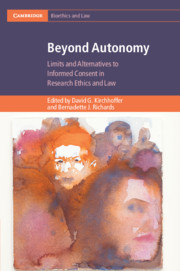Book contents
- Beyond Autonomy
- Cambridge Bioethics and Law
- Beyond Autonomy
- Copyright page
- Contents
- Tables
- Contributors
- Acknowledgements
- Introduction
- Part I Exploring Problems of Respect for Autonomy in Bioethics, Law and Society
- Part II The Search for Alternative or Complementary Concepts Surrounding Autonomy
- Part III Beyond Autonomy: Turning to the Community to Protect the Individual
- Index
- Books in the Series
Part III - Beyond Autonomy: Turning to the Community to Protect the Individual
Published online by Cambridge University Press: 20 September 2019
- Beyond Autonomy
- Cambridge Bioethics and Law
- Beyond Autonomy
- Copyright page
- Contents
- Tables
- Contributors
- Acknowledgements
- Introduction
- Part I Exploring Problems of Respect for Autonomy in Bioethics, Law and Society
- Part II The Search for Alternative or Complementary Concepts Surrounding Autonomy
- Part III Beyond Autonomy: Turning to the Community to Protect the Individual
- Index
- Books in the Series
Summary
The suggestion to use medical information for the purposes of health service research is not new. But the British government’s latest attempt was particularly ham-fisted. ‘Care.data’ was an initiative that sought to ‘bring together health and social care information from different healthcare settings, such as GP practices, hospitals and care homes, in order to see what’s working really well in the NHS – and what we could [improve]’.1 Rather than using information without consent, the idea was to have an opt-out rather than opt-in system. In many ways, it was a laudable goal. However, the programme had to be scrapped following a critical report by Dame Fiona Caldicott.2 Caldicott did not find fault with the scheme’s philosophy, noting that information sharing was vital to create an efficient healthcare system and to support research, but she did find that the opt-out system needed to be strengthened and that, crucially, the public had yet to be convinced of the case for data sharing.
- Type
- Chapter
- Information
- Beyond AutonomyLimits and Alternatives to Informed Consent in Research Ethics and Law, pp. 151 - 199Publisher: Cambridge University PressPrint publication year: 2019

